Arturia AstroLab 88 – The Ultimate Stage Keyboard?
Harder, Better, Faster, Stronger?
[30 September 2025] The Arturia AstroLab 88 stage keyboard is a live performer’s dream, packed with the sounds of Arturia’s acclaimed software instruments. A new video shows the AstroLab 88 in action!
All about the Arturia AstroLab 88
Video: Experience the Arturia AstroLab 88 in Action
The Arturia AstroLab takes a slightly different approach than conventional stage keyboards. As a hardware version of Analog Lab, it brings the sounds of the V Collection 11 to the stage, paired with an intuitive and live-ready user interface. A new video from our friends at bonedo.de delves deep into the features and sounds of this innovative stage keyboard. Experience the Arturia AstroLab 88 in action!
The Arturia AstroLab 88, AstroLab 61, and compatible accessories are available at Thomann*.
Arturia AstroLab 1.5 Update for 61 and 88 Key Versions
[17 July 2025] Arturia delivers on its promised update to its VST in a Box concept, AstroLab, with almost full support for V Collection 11 and a raft of other improvements.
When Arturia dropped the AstroLab 88 just after Superbooth 2025, they also promised a new firmware update that would allow it, and it’s smaller 61-key sibling, to accommodate the latest updates to V Collection 11.
This update would launch alongside a new version of Analog Lab Pro to align everything accordingly. They promised a launch date of “by July 17th,” and they have now delivered on that date with everything they promised.
AstroLab 1.5 firmware now includes full support for the following plugins within the Analog Lab Pro framework:
- Augmented MALLETS
- Augmented YANGTZE
- Jup-8000 V
- MiniBrute V
- Pure LOFI
- Synthx V
- SEM V3
On top of this support comes other improvements, such as the ability to send Program Change to external devices, a lock feature on the ARP/CHORD/SCALE function so that the settings are kept whilst browsing, new Looper demo files, a new factory library and the ability to transfer a playlist from AstroLab to Analog lab.
The ARP rate is now set at 1/16 by default, and they have improved the feel of the aftertouch too. There is also a bugfix for Piano V, but sadly, still no direct support for Mellotron V and CP-70 V, one presumes because of licensing issues with these plugins being used on hardware.
The update is free, and you have to follow a fairly strict process to ensure the update works properly, so take my advice and read the instructions BEFORE updating to save yourself a whole lot of messing around. Also, give yourself some time as the update process isn’t that rapid. However, you should be done within 30 minutes.
You can download both the firmware update (there are separate update files for both versions of AstroLab) and the latest version of Analog Lab V (5.12.0.6227) in the resources section of the AstroLab webpage, but we would recommend updating Analog Lab via the Arturia Service Center FIRST, then updating AstroLab within Analog Lab. Either way, be sure to fully read the update instructions for the smoothest experience.
AstroLab 88 boasted a newer, faster CPU, with Arturia promising efficiency improvements on the 61 version. From my early testing, the 61 definitely feels a little quicker and is still, in my humble opinion, a fantastic concept, brilliantly executed.
Arturia AstroLab 88
[27 May 2025] It’s been a year since Arturia launched the original AstroLab. Now the AstroLab 88 aims to take things up a level.
2024 saw the 25th anniversary of Arturia, the French music technology company that started small and is now, in this correspondent’s opinion, one of the major players in the arena. To celebrate this event, they launched two quite different and incredibly bold concepts.
One was the remarkable PolyBrute 12, the other was AstroLab, Arturia’s stage keyboard concept that married together their software and hardware efforts into a powerful, versatile instrument for the gigging musician.
AstroLab 88
Now we have AstroLab 88, a bigger, faster version that delivers the kind of quality you’d expect from a keyboard built for touring, but with the immense flexibility of powerful software instrumentation. It would be easy to dismiss this as Analog Lab Pro in a box. However, it goes beyond that.
On the surface, AstroLab 88 is a full-sized version of the original with an identical user interface and that infamous/ingenious circular screen controller placed slap bang in the middle. However, there are two key differences, pun not intended.
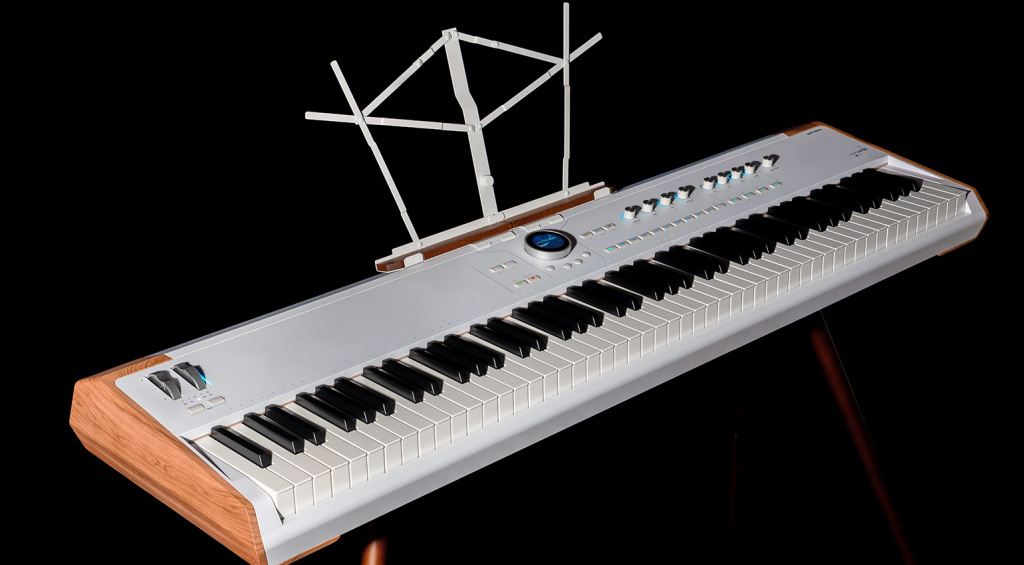
The New Keybed
Firstly, there is the keybed. The AstroLab 61, as I guess we will have to call it now, had a very nice synth-action keybed. The 88 comes with something much more appropriate. It is fitted with a Fatar TP-40L, the ‘L’ denoting a lighter touch.
Having played this in Arturia’s private room at Superbooth 25, it feels incredibly nice, and the lighter touch will suit those instruments in the V Collection that demand faster playing styles. Compared to the wonderful TP/110 they fit to the new KeyLab 88 Mk.3, the AstroLab 88 feels a little lighter and airier, but with more quality and authenticity to the action.
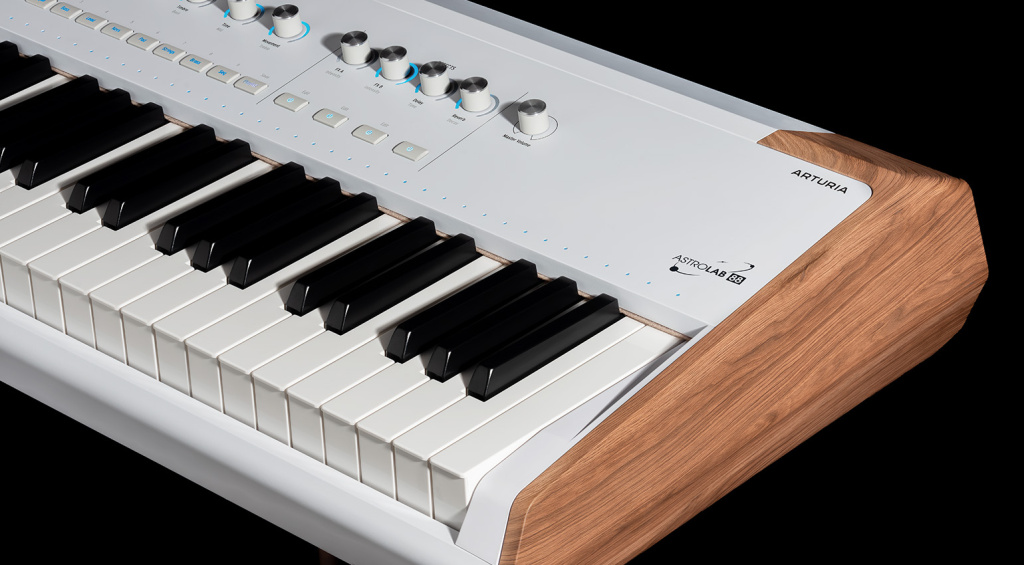
New CPU and Firmware
The other significant difference in the AstroLab 88 is the inclusion of an upgraded CPU compared to the one used in the 61. This has two major benefits, one being a boost to polyphony and the other being improved load times of the more sample-heavy instruments. I found this to be quite noticeably faster when I played it.
This boost in performance will become even more noticeable with version 1.5 of the AstroLab firmware that brings not only improved performance, but also support for V Collection 11, better playlist transfer between Analog Lab and AstroLab, as well as direct FX and MIDI editing and program change commands so that you can control external devices from the AstroLab directly.
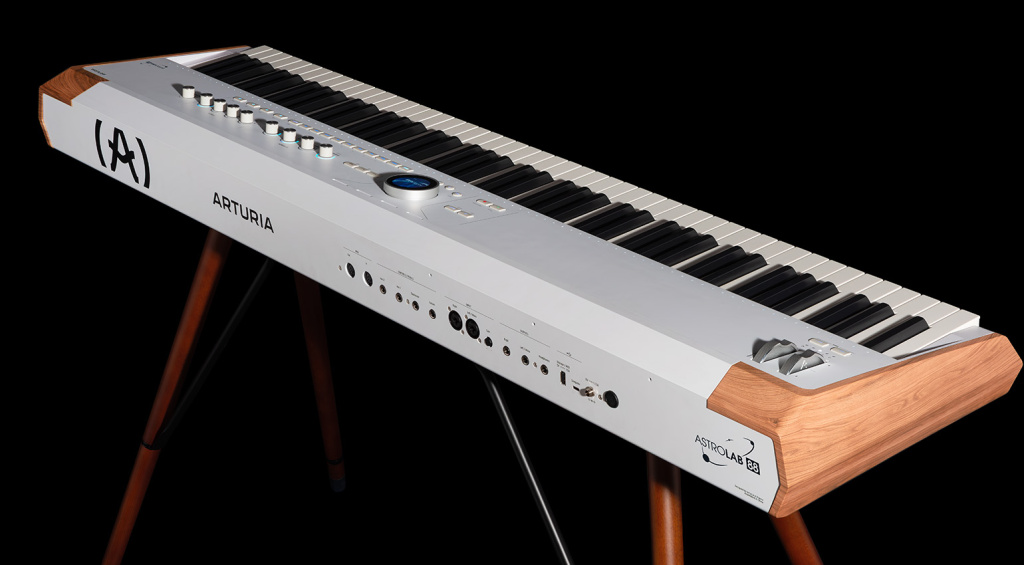
This firmware will also be available for the AstroLab 61 and, I am told, will improve performance on that instrument too. I worry when I see claims of “future proof” in marketing blurb, and had these concerns when first checking out the 61. Only time will tell if the original 61 will get left behind in terms of V Collection support in years to come.
In Conclusion
AstroLab 88 was the inevitable next step for this instrument, and its abilities to be used as your central stage keyboard just improved a whole bunch. Add to this all of the existing AstroLab features, such as the ability to vocode, bring audio in via physical inputs or via Bluetooth, dedicated WiFi connectivity to a mobile device for quick and easy management and the mere fact that it can contain 40+ instruments and 1600+ patches, and AstroLab 88 might just be the most versatile stage keyboard ever made.
AstroLab 88 is available to order now for €2,499. AstroLab firmware 1.5 will be released before July 17th 2025. AstroLab 61 is also available for just €1,449.
More Information
*This post contains affiliate links and/or widgets. When you buy a product via our affiliate partner, we receive a small commission that helps support what we do. Don’t worry, you pay the same price. Thanks for your support!
7 responses to “Arturia AstroLab 88 – The Ultimate Stage Keyboard?”

 3,9 / 5,0 |
3,9 / 5,0 | 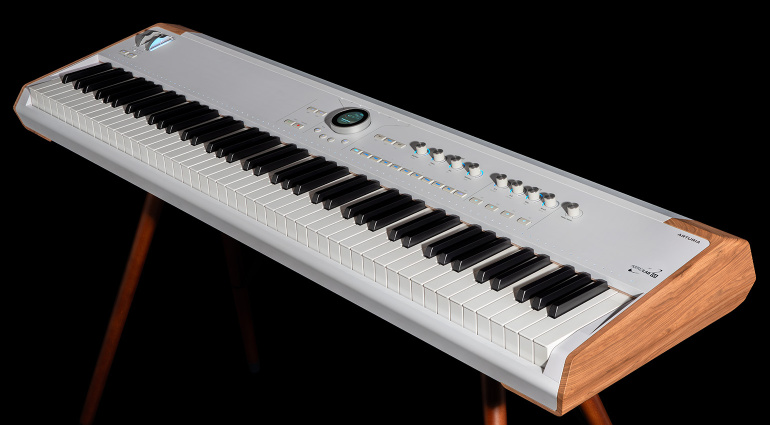
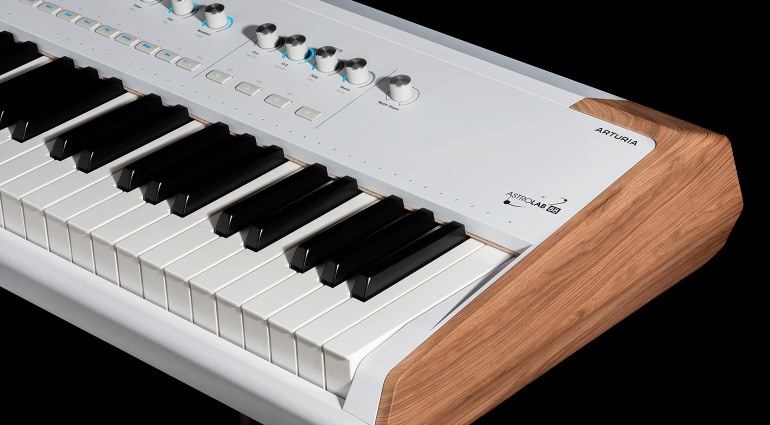


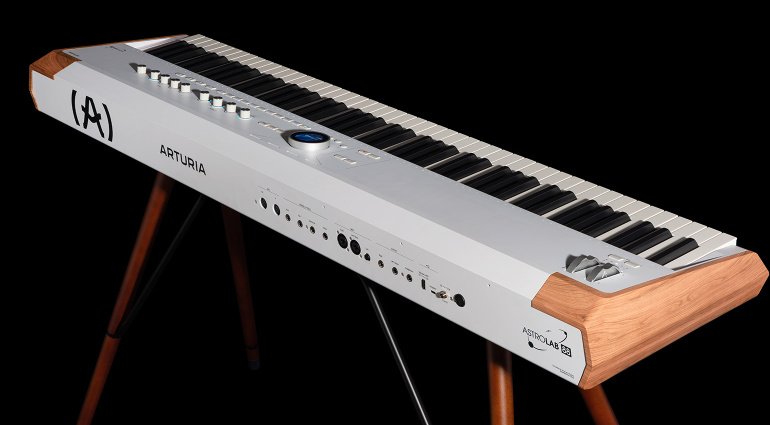





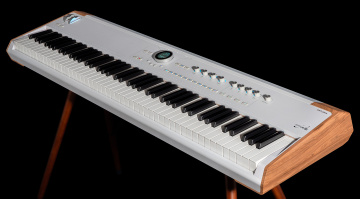

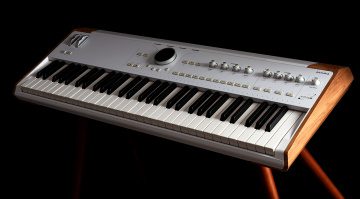
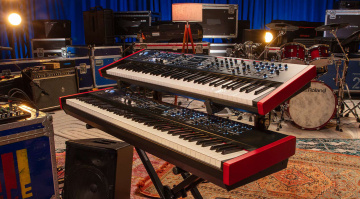
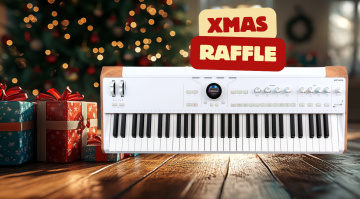
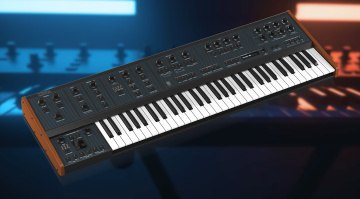
I really hope they are going to add NKS support like they are to the rest of the Lab series
I have never tried the Arturia keyboard before
I have the MODX7+(12lbs) and RD88 (29lbs) vs. this 50lbs. I cannot lug 50lbs around at 61 yrs old. Also, eyes are degrative and most of us seasoned players like a large screen like the MODX or Roland Phantom. My RD88 is used only for piano/strings. The diminutive rotator knob and small little circle is a deal breaker for me. I know sets can be designed “off native” in the software. But what happens when you do some dynamic patch change or need to change a list live? I’m not doing the knob scroll in a panic thank you. And $2,400 is on the steep end as well, I think. It sure looks and sound elegant, but less practical as a gigging instrument.
Not even a full demo of any kind!!
What’s the point??
in live performance it is essential to be able to change presets quickly, the display does not convince me at all, the Korg Kronos is much more suited to live performance.
wtf is that screen lol
Nearly a grand more for an 88 over a 61 is at least DOUBLE the usual extra charge most manufacturers make for a 61-88 size increase.
And, way to kill your 61 sales, Arturia..! Nobody’s going to buy a 61 until the upgraded CPU is installed as well as on the 88.
You are currently viewing a placeholder content from Facebook. To access the actual content, click the button below. Please note that doing so will share data with third-party providers.
More InformationYou are currently viewing a placeholder content from Instagram. To access the actual content, click the button below. Please note that doing so will share data with third-party providers.
More InformationYou are currently viewing a placeholder content from X. To access the actual content, click the button below. Please note that doing so will share data with third-party providers.
More Information